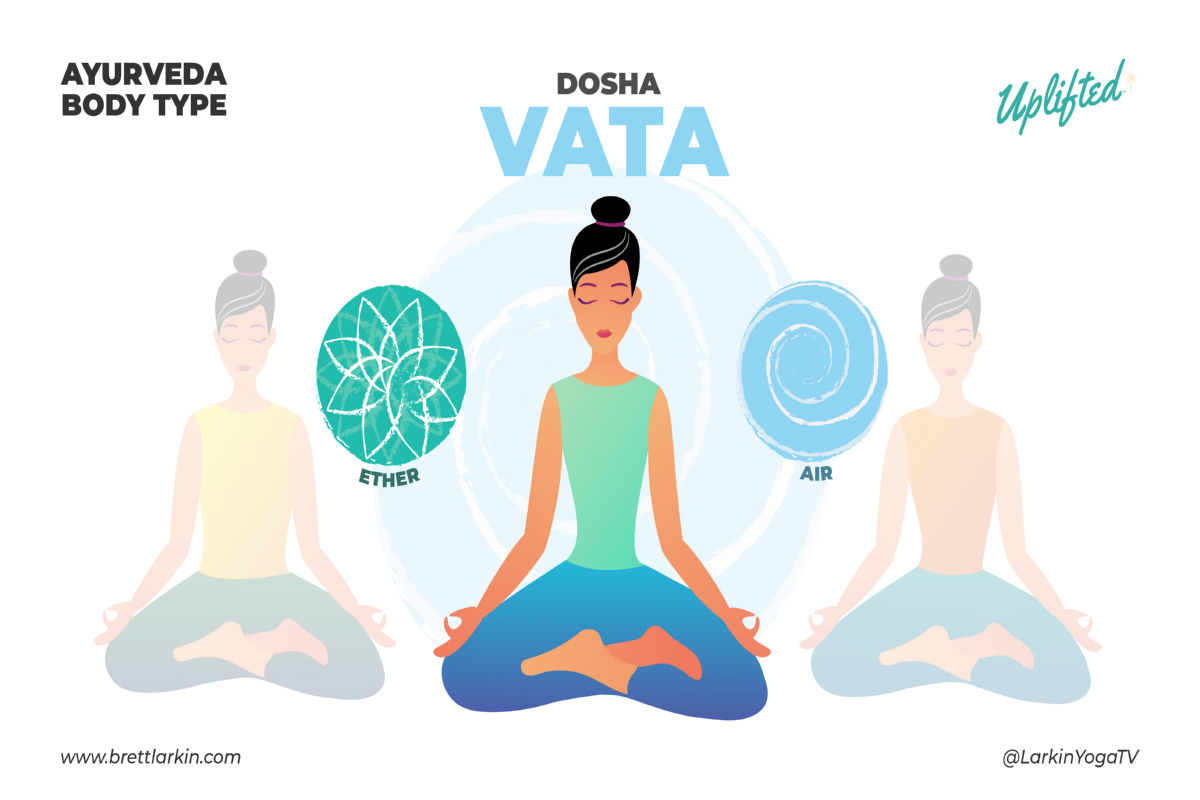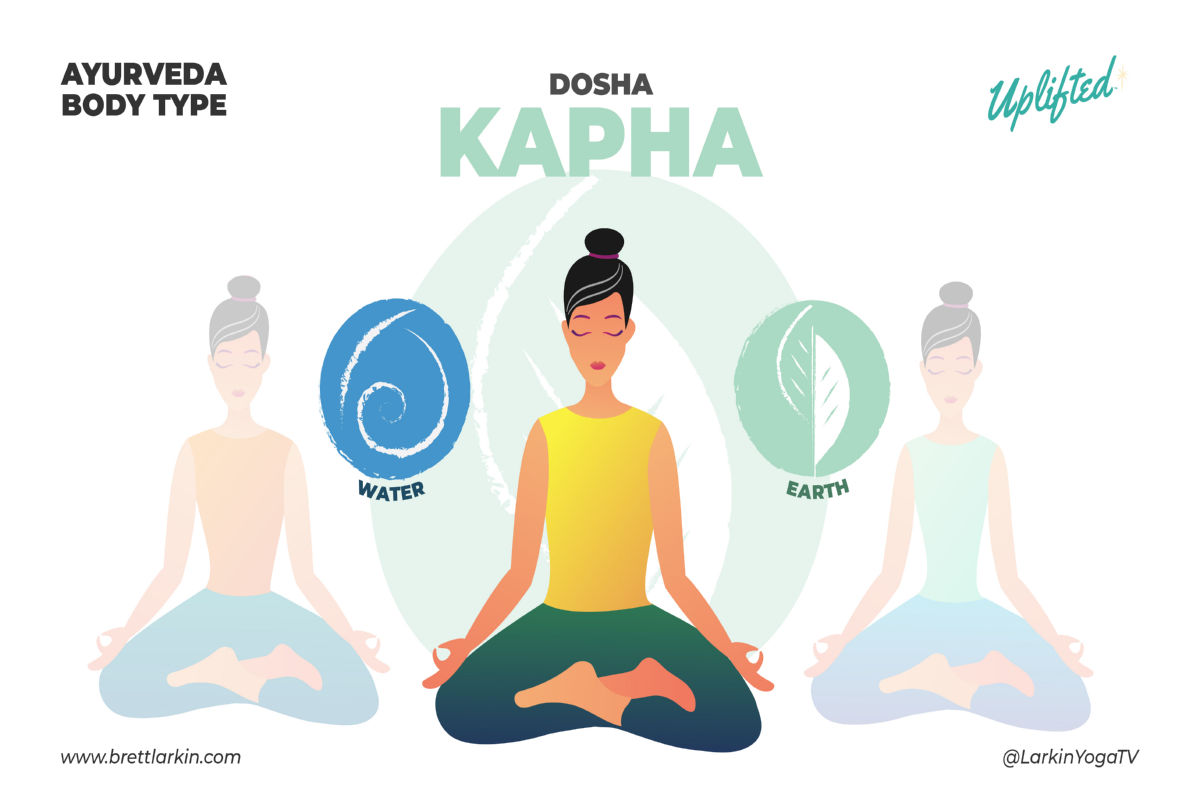
When it comes to self-discovery, you’ve probably tried it ALL. I know I have—and so have most of my students!
You probably know your astrology sign and attachment style, right along with your birth time and blood type. Maybe you’ve dabbled in getting to know the cycles of the moon, had a palm reading or two, or have your psychic on speed dial.
Whatever helps you uncover the amazingness that is YOU, I’m all for. Truly, you do you—and I believe with every new “thing” you try, you learn more about who you are and what you’re here to do.
BUT! What if I told you there’s an ancient system that will help you fully understand every part of yourself—mind, body, and spirit?!
If you’re like me and intrigued by things that stand the test of time, Ayurveda—and discovering your Ayurvedic energy type—may have popped up on your radar.
And let me tell you, this isn’t just the latest trend. Learning your Ayurvedic constitution is totally life-changing.
So, let’s jump in and get you acquainted with the most powerful tool you’ll ever discover…it’s time to meet your dominant Ayurvedic element—a.k.a. your dominant dosha.
What Is An Ayurvedic Constitution?
First, let me introduce you to Ayurveda. Translated from Sanskrit, Ayurveda literally means “life knowledge.” I like to think of Ayurveda as yoga’s sister science—an ancient system of medicine that originated in India thousands of years ago.
At its core, Ayurveda is about creating balance in the mind, body, and spirit with a focus on each individual’s mind-body constitution. Since the body and mind are inexorably connected, figuring out your personal constitution is transformative.
The Three Dosha Types: Vata Pitta Kapha
According to Ayurveda, each person contains a mixture of three elements, called doshas. The three elements (doshas) believed to be present in a person’s make-up—their body and mind—are Air (Vata), Fire (Pitta), and Earth (Kapha).
Since no two individuals are exactly the same, each person contains a mixture of all three of the elements above, and typically, one is dominant. It’s almost as if we’re each a magic potion—some with a little more Air, or Fire, or Earth—but no two are exactly alike.
The goal of working with your Ayurvedic constitution is not to bring all of your elements into perfect balance, but to find the combination of these three elements that lets you operate as your best, most authentic, joyful self.
What happens to most of us, however, is that our dominant element (dosha) tends to take over, gain momentum, and have us snowballing through our life as it “runs the show” in our minds and bodies.
So, how do you know which is your dominant element? It’s easier than you think.
Let’s meet the three dosha types. Each element—Air, Fire, and Earth—have different strengths, as well as different imbalances that often take control in your mind.
Disclaimer: Maybe you’ll recognize yourself in one (or all!) of these element types.
That’s normal! Remember—you’re looking to find out which element is the most dominant within you, the majority of the time. Once you know, this knowledge will help you keep your mind, body, and spirit in a healthy, vibrant state.
Vata
Air dominant: Energetic, creative, lively.
The Vata type loves to create. They have a million ideas and want to start them all, today! Vatas are visionaries, seeing the “big picture” and an expansive vision others don’t always see.
The issue? With your creativity flowing and leading you in so many directions, it can be hard to stay on task. Or finish a project.
You feel most alive when you can express yourself, when you’re creating, and when you have freedom to follow your whims.
When things get too practical and boring, your interest fades. No one should come to you with all the nitty-gritty details of a task. Details are a snooze fest for you. But adventure? Bring it on!
Physically, if you’re Vata dominant, you’re likely to have a smaller build, dry skin and hair, chilly hands and feet, and you might struggle with sleep and digestion. Your energy comes in sudden bursts, followed by a sudden onset of fatigue.
Emotionally, your mood can change like the wind. Sometimes, all that energy can cause anxiety and insomnia. And organization is typically not your strong suit. In fact, you probably have ideas written on scraps of paper, in your Notes app, and on receipts. If only you had time to create them all!
Signs of imbalance:
- Overwhelm. When your air gets too high, you might feel frozen, unable to know where to begin.
- Inability to focus. Similarly, you might feel like your head is spinning with ideas, and you can’t find the focus to even start on one.
- Hypersensitive. If you’re wound up and frustrated, you’re more likely to be in hypersensitivity mode.
- Perfectionistic. If you can’t finish your project because it has to be perfect, then it’s time to balance out your air element.
Common difficulties:
- Overworking. Because your energy comes in bursts, it’s easy for you to push well beyond what you should. This can be very depleting and actually harm your quality of life if you tend to get caught up and work too much.
- Not knowing when to quit. Similarly, because you have such high energy (while it lasts), you often don’t know when to quit. You might be the last one on the dancefloor, or the last one up at night. Setting limits is hard.
- Handling the practical details. With all the ideas floating around in your brain, breaking them down into actionable steps is sometimes challenging. It can be easy to flit from one idea to the next without actually finishing anything.
- Getting (and staying) organized. All those scraps of paper with your ideas, mixed in with the emails and Notes you leave for yourself, can become a bit of a hot mess. It can be difficult for you to stay organized.
How to heal this dosha:
The key for the Vata type is to bring stability, support, and calmness to your life.
- Find an organizational tool that works for you. Maybe it’s a notebook, a project management tool like Asana or Notion, or a wall where you always stick your post-its. Finding a way to capture and organize your ideas is crucial.
- Adopt a routine for sleep and mealtimes to nurture yourself and offer consistent nourishment. Do a calming yoga pose while you wait for the bath to fill. Light a candle and journal in the morning or evening. Find ways to slow down.
- Keep yourself warm and find ways to weave self-care throughout your day. Go for a walk between meetings, carve out time for some yin yoga, or schedule a massage for the end of the week as a treat. Plan your meals and get a big water bottle to ensure you’re hydrated. Make sure you’re taking care of YOU.
Pitta
Fire dominant: Strong willed, determined, decisive.
The Pitta type loves to achieve. They have a ton of passion and want to always be doing something productive. Pittas are efficient, methodical, and organized. They make incredible team leaders and they’re often the person on vacation who has everything planned, down to the hour.
The issue? With your strong drive, it can be hard to stop pushing yourself. Or relax.
You feel most alive when you can check things off your to do list.
When things get too chill and relaxed, you’ll find a way to keep busy, even if you’re tired.
Physically, if you’re Pitta dominant, you’re likely to have a medium or muscular build, quick digestion, and a ravenous appetite for food, sex, and life. Your intensity makes you a go-getter, decision-maker, and strong public speaker. Ironically, your energetic comfort zone is stress.
Emotionally, you run hot. Patience is typically not your strong suit and you might be known for your short temper. In fact, you probably have a tendency to easily get frustrated with others, especially if you think they’re moving too slow.
Signs of imbalance:
- Irritability. If you find yourself turning into a fire-breathing dragon, You turn from capable leader to a bossy, fire-breathing dragon. You’re irritable, impatient, judgmental, controlling.
- Impatience. If waiting for anything has suddenly become your worst nightmare, it’s a sign your fire is turned up too high.
- Needing to control (everything). As someone who is a natural go-getter, it can be hard to not want to control things. However, if you find yourself becoming a bit of a control freak, then it’s time to seek balance.
- Anxiety. Oftentimes, anxiety is a result of excess Fire in the mind. If you’re experiencing more anxiety than usual, it’s time to balance out your Pitta.
Common difficulties:
- Slowing down. As a go-go-go person, you’re addicted to the sense of accomplishment – and ensuring admiration – that follows a hard day’s work. It’s super challenging for you to slow down or take a day off.
- Delegating. Usually, you’d rather do things yourself so you know they’re done “right.” Delegating tasks to others, even something as simple as washing dishes, can be hard.
- Getting enough sleep. Because you have a passion that burns deep, you probably want to make the most of each day (and night). This can lead to not getting enough sleep and ultimately, burnout.
How to heal this dosha:
The key for the Pitta type is to bring nourishment, relaxation, and a practice of surrendering to your life.
- Schedule in downtime. Whenever you go to make your to do list and review your schedule for the day, be sure to include time to stop and rest. Stick with it and don’t blow past your breaks. Remember that your work will be better the more rested you are.
- Commit to daily self-care. Long walks in nature, contemplative baths in moonlight, and spending time near water are good ideas.
- Practice letting go. Put away your phone for an afternoon. Step away from your to do list and realize you are innately enough, without achieving more.
Kapha
Earth dominant: Steady, stable, with high stamina.
The Kapha type loves to chill at home. They move at their own pace and do not want to be rushed. Kaphas are grounded, level-headed, nurturing, and give phenomenal advice. They are reliable, steady, loving, and loyal.
The issue? With your love for comfort, it can be hard to embrace change.
You feel most alive when you can take your time, do something nurturing, like make soup or read a book, and have endless time to relax.
When things get too chaotic, you tend to reach for a bag of chips and zone out on the couch, binging episode after episode.
Physically, if you’re Kapha dominant, you’re likely to have rich oily skin and hair, a thicker or more substantial build, and large, radiant eyes. You will typically be a great sleeper and have regular digestion, but can struggle with bloating, allergies, and weight gain.
The emotional qualities of a Kapha are often nurturing, kind, and loving, but can become overly rooted and reluctant to change. Action is not typically your strong suit. In fact, you probably love to keep your weekends clear of plans so you have time to veg at home.
Signs of imbalance:
- Procrastination. If your to-do list only keeps getting longer, then your Kapha might be out of balance. Too much Earth can lead to putting off action.
- Tiredness. If you find yourself increasingly tired, no matter how much rest you get, then you might need to balance out Kapha with some fire or air.
- Lack of motivation. If hitting the next episode button becomes an everyday occurrence, then it’s time to get your Kapha in check. Feeling a lack of motivation is common in Kapha types and can lead to more lethargy and procrastination, becoming a vicious cycle.
Common difficulties:
- Accepting change. If there’s one thing Kaphas love, it’s for things to stay the same. Change is especially unwelcome with this energy type.
- Boundaries. Because Kaphas are so nurturing, it can mean they often put others’ needs before their own. This makes upholding your boundaries a challenge.
- Making decisions. If inaction is your go-to, then taking decisive action can feel especially challenging.
How to heal this dosha:
The key for the Kapha type is to nurture others while honoring your own boundaries with a quiet confidence that uplifts everyone around you.
- Keep a tidy, clean home. It is important for Kapha types to strive to keep their homes and workspaces clean. Clear up any clutter and surround yourself with bright, warm colors and decorations you love.
- Drag yourself out of the house, even if you’d rather stay in. Avoid becoming stuck in a rut: add more action to your life by trying spicy new foods, exciting, fun new activities, and meeting more people.
- Wake up earlier. Consider waking up an hour earlier in the morning, ignoring the urge to sleep in, and getting your morning started with some movement.
Fall in love with my 200-Hour teacher training or …
Experience 3 Training Videos from Inside My 200-Hour Online YTT

Ayurvedic Practices For Each Dosha
Now that you have a basic understanding of Ayurveda and the doshas, you might be wondering: how can I balance my energy?
Although Ayurveda is an in-depth science, there are three practical ways you can start balancing your dominant dosha right away, through what you eat, how you move, and your daily habits.
Diet
Ayurvedic medicine places a great deal of importance on the digestive system as a means of fueling, healing, and regulating the energy of the body-mind system. Depending on if you’re Vata, Pitta, or Kapha dominant, your digestive system will need certain foods and eating practices to help keep it in balance.
For that reason, prioritizing foods that balance your energy type by following an Ayurvedic diet allows you to fuel your digestive power in the most efficient and effective way possible. Here are some foods you should prioritize, based on your dominant dosha:
- Vata: Healthy fats, juicy fruits, cooked veggies, well-sourced dairy products, nuts, mung beans in dahl, and basmati rice. Avoid processed foods.
- Pitta: Cold foods, such as cucumbers, cow ghee, olive oil, coconut oil, basmati rice, sweet fruits such as grapes and melons, and soothing herbs and spices such as coriander, cardamom, fennel seeds. Avoid spicy food.
- Kapha: A colorful plate of fruits and veggies, such as apples, pomegranates, apricots, leafy greens, cucumbers, asparagus, chickpeas, celery, black beans, and cranberries. Plus, herbs and spices such as cayenne pepper, mustard seed, and ginger. Since cold weather is often your favorite, prioritize warm foods.
Physical activity
Moving your body is one of the best ways to shift your energy. The amount and quality of physical activity you do in a day can help balance your dominant dosha. So can your amount of rest.
Depending on your Ayurvedic type, you may need more or less heart-raising activity. If you’re a fiery Pitta, you’ll want to prioritize slowing down; while if you’re an earthy Kapha, you’ll want to prioritize speeding up. Here’s some activities to try based on your dominant dosha type:
- Vata: Grounding is essential. Take off your shoes and go for a walk in the grass. Practice yoga that’s slow and keeps you close to the floor, like restorative or yin.
- Pitta: Slowing down is essential. Go for a run, then do some slow-moving yin to cool down. Take a long bath at the end of the day. Practice breathwork and prioritizing a long, slow breath.
- Kapha: Motivation is essential. Gently push yourself to go to the fitness class you’ve been avoiding. Try a style of yoga you’d normally avoid, like Vinyasa. Walk a different route than you normally do, and pick up the pace to get your heart pumping.
Daily life
Based on your energy type, you’ll have certain daily habits that stem from your innate tendencies. For instance, a Pitta will shoot out of bed, ready to work; while a Kapha might hit snooze on the alarm, missing their first meeting.
Becoming aware of your innate tendencies will help you balance your energy. Here are a few things to try:
- Vata: Commit to work on a schedule. Start writing in your journal at 8 a.m. sharp, and honor that pledge to yourself. Vatas thrive on a predictable schedule.
- Pitta: Treat yourself to an unexpected break. End work a little earlier than usual. Pause intentionally throughout the day and lie down, even for 5 minutes. Frequent breaks help you to respond, rather than react from that place of pure heat.
- Kapha: Challenge yourself to do one small thing outside your comfort zone. Say hi to a stranger. Sign up for the class you’ve been eyeing for months. Apply for the promotion.
Ayurvedic Dosha Quiz
There are endless dosha quizzes on the internet, so I created one of my own to offer you more insight into your doshas. Take what resonates with you and, as always, trust yourself.
This will help you know what steps to take to balance your mind-body energy.
Final Thoughts
Understanding your dominant dosha can help you utilize the benefits of Ayurvedic medicine and achieve optimal health. If you want to go deeper, join the Uplifted Community to learn more.
Next Steps
- Take my History of Yoga Course to learn all about yogic principles and how they are applied to daily life!
- Order my Yoga Life book for a practical guide to applying yogic principles to your life and constitution.
- Check out my Yoga Philosophy knowledge hub for more inspiring content
- Join Uplifted for exclusive content that you can access right from the app. Take a deep dive into your practice with me this year!
Experience 3 Training Videos from Inside My 200-Hour Online YTT

YOU MIGHT ALSO LIKE
- My Homemade Immunity Tea Recipe For Winter
- How To Do An Ayurvedic Panchakarma Cleanse At Home (Safely)
- Ayurveda Food Combining: The Key to Balanced Digestion
- How To Reduce Body Heat According To Ayurveda
- Types Of Agni In Ayurveda And How To Balance
- How To Balance Doshas And Step Into Your Powerful Self
- The Eight Branches Of Ayurveda: Guide To A Happy Life
- Yoga for Vata Dosha: Practice Poses and Tips
- Yoga for Pitta Dosha: Practice Poses and Tips
- Yoga for Kapha Dosha: Practice Poses and Tips
- Jal Neti Kriya: The Best Thing You Can Do To Clear Your Head Right Now
- My Exact Ayurveda Morning Routine For Yogis
- The 6 Stages of Disease in Ayurveda
- Discover Your Ayurvedic Constitution and Balance Your Mind, Body, and Spirit
- Understanding the Basic Principles of Ayurveda for Yogis
- 3 BEST Ayurveda Schools for a Holistic Ayurvedic Certification
- What Are Nadis? Your Guide to Energy Channels In Your Body.
- What Is An Ayurvedic Diet? Foods For Your Doshas
- A Day Around the Doshas: What I Learned When I Followed the Ayurvedic Clock












